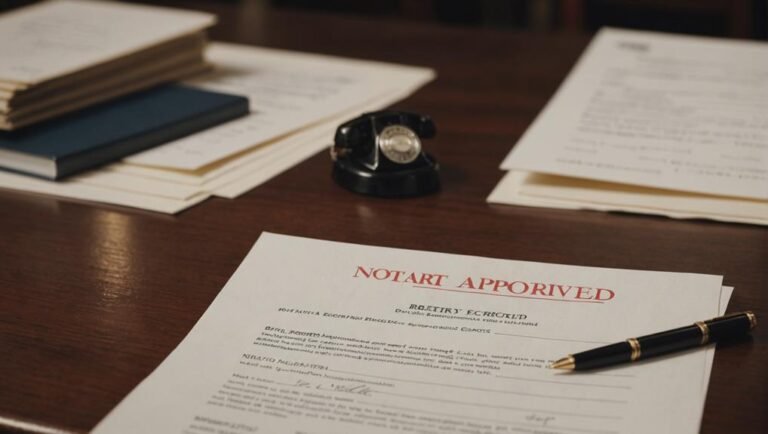Notaries in Florida risk fines, commission revocation, or severe legal consequences for breaching regulations. Ensuring compliance is crucial to avoid penalties. If you want to understand the specific penalties, explore further into Florida's notary regulations and procedures.
Key Takeaways
- Notaries in Florida face fines for violations.
- Revocation of notary commission is a possibility.
- Severe legal consequences for misconduct.
- Non-compliance can lead to penalties.
- Upholding ethical standards is crucial.
Notary Commission Suspension and Revocation
When a notary in Florida faces allegations of false statements or misconduct, the Governor holds the authority to suspend or revoke their commission. Notaries in Florida must adhere to strict regulations to maintain their commission and avoid suspension or revocation.
If a notary's office is declared vacant by the Governor, they're required to surrender their commission promptly. Additionally, resigning notaries must return their commission and destroy their official seal as part of the process.
It's important to note that automatic reappointment of notaries is prohibited under Florida law. Hence, notaries must make sure they conduct their duties with integrity and in compliance with all state laws and regulations to retain their commission. Failure to do so may lead to severe consequences, including suspension or revocation of their notary commission.
It's vital for notaries in Florida to uphold the highest standards of professionalism and ethical conduct to avoid facing such penalties.
Application Requirements and Fees
To apply for a notary commission in Florida, you must submit the required documents and pay a $25 application fee along with any additional applicable fees. These documents include an oath, bond, and the designated application form provided by the Department of State.
As part of the application process, you'll need to disclose personal information, details of any criminal history, and information regarding your professional license. Once commissioned, notaries have a responsibility to inform the Department of State of any changes within 60 days.
Additionally, the Governor reserves the right to request additional information for the purpose of determining eligibility for a notary commission. Ensuring compliance with these application requirements and fees is essential for obtaining and maintaining a notary commission in Florida. It's vital to adhere to all stipulated regulations to fulfill the obligations of a notary public effectively.
Suspension and Revocation Process
The Suspension and Revocation Process in Florida grants the Governor authority to take action against notaries found in violation of specified grounds, leading to potential suspension and subsequent revocation of their commissions. Notaries engaging in fraudulent activities, making false statements, or committing misconduct may face suspension.
When a notary's office is declared vacant due to suspension, they're required to surrender their commission. Resigning notaries must return their commission and destroy their official seal as part of the revocation process. Automatic reappointment isn't allowed, necessitating notaries to reapply if they wish to be reappointed.
To avoid suspension or revocation, notaries must strictly adhere to regulations and guidelines governing their conduct. It's essential for notaries to conduct their duties with integrity and in compliance with the law to maintain their commissions and prevent facing the consequences of suspension or revocation in Florida.
Bond and Oath Obligations
Notaries in Florida are obligated to provide a $7,500 bond payable to individuals harmed by their actions, serving as a financial security measure against notarial misconduct. This bond is a personal commitment placed upon notaries, as stipulated by statutes enacted by the Florida Legislature.
Alongside the bond requirement, notaries must take an oath to faithfully and honestly discharge their duties as public officers. The bond amount may need to be increased for reappointment after January 1, 1999, as outlined in the relevant legislation.
Surety companies involved in handling notary applications must strictly adhere to approved bond formats established by the Department of State to guarantee compliance with the regulations governing notarial activities in Florida.
These measures collectively aim to uphold the integrity of notarial practices, safeguard the public interest, and deter any instances of malpractice within the notary profession.
Notarization Regulations and Procedures
Florida's notarization regulations and procedures encompass a range of duties and guidelines that govern the notarial acts performed by appointed individuals. Notaries in the state are granted authority by the Florida Legislature to officiate marriages, administer oaths, and acknowledgments.
Additionally, Florida allows for electronic notarization, subject to specific rules and requirements set forth by the state. To prevent misuse, Florida imposes restrictions on the possession and use of notary public commissions, making unlawful possession a felony offense.
When performing notarial acts, notaries in Florida must adhere to stringent identification requirements, ensuring the proper verification of individuals involved in the signature notarization process. Acceptable forms of identification are regulated to maintain the integrity of notarization services and protect against potential misdemeanors or felonies resulting from non-compliance.
Investigation by Postal Inspectors
In cases involving suspected forgery of U.S. or Florida Treasury checks, the Postal Inspectors Office conducts thorough investigations. When allegations of forged Treasury checks arise, the Postal Inspectors collaborate with local law enforcement agencies to investigate these financial crimes. Such investigations can lead to criminal or civil court proceedings, with both state and federal authorities possessing concurrent jurisdiction over these cases. Typically, joint efforts between state and federal authorities are pivotal in delving into the complexities of forged Treasury checks. Below is a table summarizing key points regarding the investigation of forged Treasury checks by Postal Inspectors:
| Aspect | Details |
|---|---|
| Investigating Agency | Postal Inspectors Office |
| Collaborative Partners | Local law enforcement, state, and federal authorities |
| Legal Ramifications | Criminal or civil court proceedings |
| Jurisdiction | Concurrent jurisdiction of state and federal bodies |
Understanding the investigative process and the involvement of various entities is essential in addressing forgery issues related to Treasury checks.
Legal Penalties for Notary Violations
Violating notary laws in Florida can result in significant legal penalties and consequences. Notaries Public must adhere to Florida statutes to avoid facing severe repercussions for their actions.
When notary violations occur, individuals may encounter a range of legal consequences, including:
- Civil penalties of up to $5,000 for notarizing a signature without the signor present.
- Third-degree felony charges for falsely notarizing a document or engaging in fraudulent acknowledgments.
- Felony offenses for using a notary public commission under a name other than one's legal name.
- Obligation to confirm the identity of individuals signing documents to comply with Florida laws.
- Potential fines, criminal charges, and the risk of having their notary commission suspended or revoked for violating notary laws in the state.
It is essential for notaries to uphold the standards set forth by the law to avoid these severe penalties and maintain the integrity of their notarial acts.
Governor's Notary Appointment Process
Notaries public in Florida seeking appointment by the Governor must meet specific eligibility criteria and undergo a thorough application process. The Governor appoints notaries public in Florida for 4-year terms. To be eligible, applicants must be at least 18 years old, legal residents of Florida, or permanent resident aliens with a recorded Declaration of Domicile. Notaries must operate within the state and demonstrate proficiency in the English language.
The application process entails providing personal information, details on criminal history, and professional license information. Prospective notaries should make sure they meet all requirements before submitting their application for Governor appointment. It's essential to accurately complete all sections of the application and provide any necessary supporting documentation to facilitate a smooth review process.
Following these steps diligently will improve your chances of a successful appointment as a notary public in Florida.
Frequently Asked Questions
What Is the Penalty for Violating a Notary in Florida?
When you violate notary laws in Florida, you may face fines, civil liability, criminal charges, license suspension, revoked commission, and other legal repercussions. Maintain compliance to avoid disciplinary actions for ethical violations and professional misconduct.
What Is the Most a Notary Can Charge in Florida?
In Florida, as a notary public, you must adhere to the fee limits set by law. The maximum you can charge for your services is $10 per notarial act. Violating pricing regulations may lead to disciplinary action.
What Is the Most Common Mistake Made by a Notary?
When notarizing in Florida, the most common mistake you can make is improper identification of signers. Failing to verify identities, missing seals, or not keeping accurate records can lead to serious legal repercussions for notaries.
What Are the New Florida Notary Rules?
To comply with new Florida notary rules, guarantee proper training on remote notarization, digital signatures, and ID requirements. Follow regulations for notary applications, record-keeping, and fees. Understand electronic notary responsibilities to avoid violations and penalties.
Conclusion
If you fail to adhere to the laws and regulations governing notaries in Florida, you could face severe penalties.
In fact, according to recent statistics, over 100 notaries in Florida had their commissions suspended or revoked in the past year due to violations.
It's essential to understand and follow all requirements to avoid legal consequences and protect the integrity of the notarial process.






